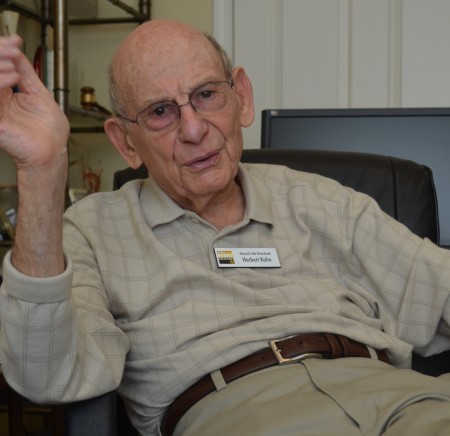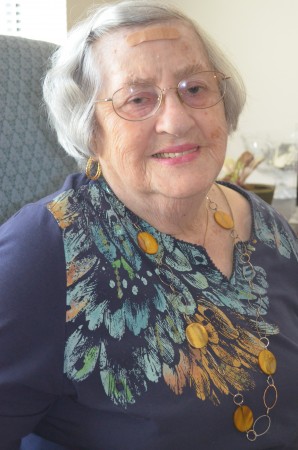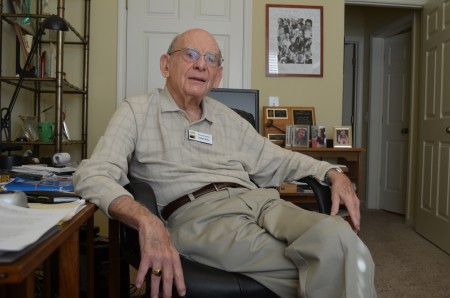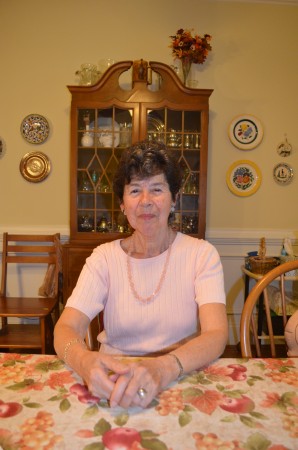For Holocaust survivor Herbert Kohn, there’s a reason to remember what happened during that horrible time. It’s to make sure nothing like it ever happens again.
“The lessons of the Holocaust must be passed on to our children, grandchildren and others to learn how to prevent and stop crimes against humanity from happening again and again,” he says.
The Marcus Jewish Community Center of Atlanta in Dunwoody held a Holocaust remembrance program April 12. The 50th annual community-wide Holocaust commemoration in Atlanta was scheduled for April 19 at Greenwood Cemetery, 1173 Cascade Circle.
“A lot of people don’t realize what happened,” Kohn said. “Nowhere have you ever seen when millions of people get killed in a very short time. It’s unbelievable. It was the worst crime that ever happened in all the history of the world.”
To keep the memory alive, survivors of the Nazi killing machine tell their stories publicly. Here are three, including Kohn, who now live in Reporter Newspapers communities. Each has a particular story to tell.
Helen Weingarten recalls her first sight of the train. “We were told to go to the train station,” she said. “When I got there, I saw a long train, a very long train, with cattle cars – those big doors that open. We were told to get into the cars.”
She was a young woman at the time, in 1944. World War II raged on European battlefields, but in the out-of-the way Romanian village where Weingarten lived, they knew little about what was happening.
Weingarten and her family – her father, mother, five sisters and two brothers – were ordered by the Nazis to leave their home. First they were taken to a Jewish school. Then they were told they were being moved to a ghetto. “I didn’t know what a ghetto was,” she said.
They didn’t stay long. “We had been there four or five weeks, until all the Jews from the surrounding areas had been gathered. After that time, we were told to go to the train station,” she recalled one recent morning at her Sandy Springs apartment.
Up to 100 people were crowded into each of the cars. A pail served as a toilet. All she had to eat was bread she had brought with her. There was no space to lie down. “There was nothing on the floor to lie down with,” she said. “When everybody was in, the doors closed and the train started. We didn’t know where it was going. We didn’t know anything. For five days, it didn’t stop. It kept going and going. After five days, I heard the train whistle. I can see it like I’m still there. It slowed down and then it stopped.”
When the train doors opened, “I saw women walking with shaved heads. I thought I was in a crazy place. Who shaves their heads in this day and age? We went out of the cattle car. Everybody had a little suitcase. [The guards] said, ‘Leave it on the side of the train and we’re going to take it to the hotel where you’re going to stay.”
The “hotel” was simply a cruel joke. She, her family and hundreds of others had been taken to Auschwitz, she said. More than a million people died in that Nazi concentration camp. Its name has become one of dark symbols of the Holocaust.
From the train, the women were herded into huge barracks, Weingarten said. “Lunch was soup in a little container. When I was through with the soup, there was sand in the bottom. … They took us out in the afternoon to a big place. There were about eight or 10 Nazi people there, with machine guns on the table. They told us they were going to shave our heads. We said, ‘No, nothing doing.’ ‘So we’re going to kill you right here,’ they said. Killing was nothing to them.”
After she had been in the camp about six months, she was placed in a group of about 500 women who were to be marched to the gas chamber. “They told us to march toward the crematorium. About five minutes later, a car came from the opposite direction and stopped. A Nazi man came out of the car and … and said, ‘These women are not going to the crematorium.’ We turned around and marched to the train station. We went to labor camps.”
Weingarten and three of her sisters survived Auschwitz, as did a younger brother. Other family members died there.
“I was at Auschwitz six months. One hundred and eighty days. It was a very, very long time.”
In 1933, when he was 6, Herbert Kohn walked to school one day only to find things had changed.
“Shortly after we arrived and I settled down in my desk, the teacher said, ‘Are there any Jews in this class?’ and I raised my hand proudly,” he said. “There were two of us in the classroom. The teacher told us to get our things and go home. ‘Jews are not allowed in public schools anymore.’
“I really did not understand what this was all about – the children in this class were all my friends. I was more concerned and worried how I would get home since I never had walked home by myself!”
That was only the beginning. Kohn lived in an upper middle class family in Frankfurt. “We lived in a very nice apartment,” he recalls. Kohn, who’s 88 now and lives in Dunwoody, saw the discrimination, segregation and persecution of Germany’s Jews that began the Holocaust.
“Everyday life for Jews became more difficult,” he said. “I remember that all park benches in public parks were marked ‘Jews not allowed’; every business, store, restaurant, movie theater that was not owned by a Jew had signs on the entrances: ‘Jews are not wanted here.’ … Things got worse every day. My father lost his job and realized that we had to get out.”
He remembers Kristallnacht in 1938, the “night of broken glass, when storefronts were broken and synagogues burned.” “It was the beginning of the killing stage,” he said. He was 12. The next day, he and his grandfather walked around town. “I actually saw what happened that night,” he said. “I saw the synagogues destroyed – my synagogue. I saw the fire trucks there, doing nothing, but making sure the fire didn’t spread.”
That same night, storm troopers arrested his father and took him away. He returned three weeks later, his hair white and having lost 30 pounds, Kohn recalls. “He had been taken to the Buchenwald Concentration Camp,” Kohn said. “He and the other inmates suffered unspeakable abuse.”
After three weeks, his Nazi captors found a certificate in his wallet. It cited him for his service in the front lines of the German military in World War I. He was released. After his return home, he fled to England. His wife and children soon followed. They ended up working on a farm in Alabama.
Kohn’s maternal grandparents died in Germany – his grandmother from natural causes in 1940 and his grandfather in a cattle car carrying prisoners to an extermination camp, he said.
Kohn enlisted in the U.S. Army. In 1945, he returned to Germany as a soldier. He saw the concentration camps. At one point, he and an Army buddy visited Frankfurt to see Kohn’s former home. He visited a former childhood friend who had turned on him and taunted him as a boy.
“I walked in and there he was, hiding behind the sofa, with his feet sticking out,” Kohn said. “My friend was there, ready to beat him up. I remember very clearly, I spat on the floor and I walked out, and took my friend with me.”
Manuela Bornstein says “many miracles” kept her alive as a Jewish child in France during World War II. She was born in and grew up in Paris. When the Nazis invaded and took control of northern France, she said, she and her family, like the other Jews of Paris, began to face greater and greater discrimination.
Her father was forced to sell his business. Her parents’ identification cards were stamped to proclaim that they were Jews. They were ordered to turn in their family radio, but she remembers that her father bought a cheap one and turned it in instead.
In 1942, Manuela was ordered to wear a yellow star on her jacket to identify herself as a Jew. She remembers wearing it on a bright green jacket on the first day of school. Her teacher called her to the front of the class and kindly told the other children that “the Germans want to hurt me, so you have to be nice to her.”
Then the Germans began rounding up Jews in Paris, she said. “We were registered as Jews and no one came for us,” she said. “To this day, we don’t understand. It was one of the many miracles as to why I’m here today.”
They decided to leave. Her mother gave her piano to a neighbor for safekeeping. A family friend burned their identifying stars. Two teens she says worked for the French Resistance helped them catch a train to the south of France, then under control of a separate government headquartered in Vichy. Smugglers helped them cross the border.
For Manuela and her younger sister, it seemed a great adventure. “We thought we were going on vacation at the time,” she said.
They ended up in a small village. The police interrogated her parents. They said the family could stay, but just for a short while. “My parents were talking the streets. ‘What to do? What to do? What to do?” she said. “Then they saw an ad for a house for rent.”
They moved in. The village held only “30 houses, 100 inhabitants,” she said. A larger community a half-mile away “had a church and a city hall and a wonderful mayor,” she said. “The mayor found a job for my father as a farm hand.” And he issued false identification cards to her parents. Later, she discovered the same man issued false cards for a number of residents who were hiding from the Nazis.
She sees now that her parents protected her and her sister from what was going on around them. Life in the village “was an adventure for us. We were very confident, very naïve,” she said. “We had a good time, my sister and I. … We were not afraid. We went to school with the other children.” They had food and shelter. After a while, her younger brother was born.
But there were signs of danger. “There was a lot of resistance in that part of France,” she said. The Germans took control of the area. When troops marched through, people would hide. “There were shootings, there were killings,” she said. “It was awful.” Also, “there were roundups all the time.”
At times, her father would spend several days at a nearby property that had a hiding place. One night, the entire family spent a night in the forests where members of the resistance usually hid. At one point, “my mother told us if we were arrested, she would give us each a poison pill and we would die,” she said.
On Sundays, she said, they raised their glass and there was this [toast]: “The four of us. Until next Sunday. Hoping to be alive another week. Until next Sunday.”
They all survived. After the allied forces liberated Paris in 1944, the family returned. “My father made his way back to Paris,” she said. “He was able to get our apartment. Also, to get my mother’s piano back.”
Little by little, they found out about members of their family who had been killed. At one point, she was told that almost 200 members of her extended family had died in the Holocaust.
But she, her parents, her sister and brother survived. “The biggest miracle is there were four of us going and five coming back,” she said.





Comments are closed.